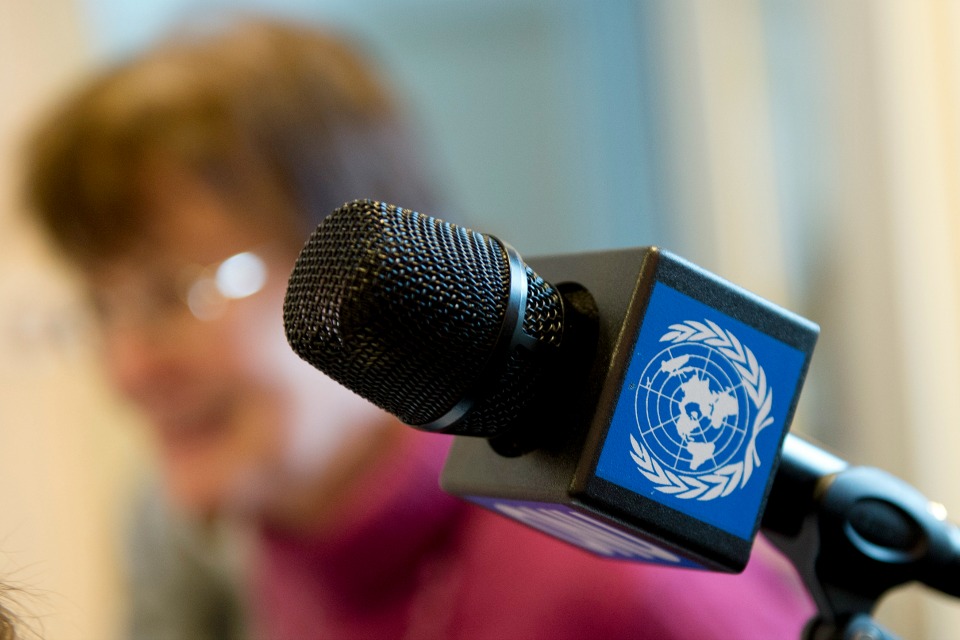"The protection of journalists, both in conflict or in peace, is an essential tenet of any functioning society"
Statement by Ambassador Matthew Rycroft of the UK Mission to the UN at the Security Council Open Debate on the Protection of Journalists

Thank you Minister, Mr President, for convening this open debate.
I welcome the adoption of Resolution 2222, the first in nine years on this important issue, and congratulate you on the leadership Lithuania has shown in moving the issue forward.
I would like to thank the Deputy Secretary-General for his insightful briefing, and Secretary-General Deloire and Ms. Pearl for their moving testimony today. I pay tribute to them and their colleagues for their work in truly difficult circumstances. And I was particularly struck by the individual stories of bravery that we heard. The journalists with moral courage who give their lives in pursuit of their profession, so that all of us may have a better understanding of the truth than the terrorist organisations or oppressive regimes would like us to have.
The protection of journalists, both in conflict or in peace, is an essential tenet of any functioning society. The freedom of journalists to report unhindered and unharmed is a vital tool to help hold authority to account. It is a building block of an open society and an effective democracy.
Sadly, this year we have seen twenty-five journalists killed around the world and we are not even half way through. To that number you can add countless more who have been intimidated, injured, detained or kidnapped.
The numbers keep growing. Only last week, in South Sudan, Pow James Raeth, a young, talented radio journalist, was shot and killed with his friend Yohanes Pal Kwek as they crossed the street in Akobo. We offer our condolences to their friends and family – and to those of all the journalists who have lost their lives this year.
We are also concerned by growing levels of harassment of journalists. Recent reports of intimidation and attacks on radio stations and newspapers in Burundi are a worrying example. We call on the government there to promote an environment where journalists are free to report on political developments, without fear of reprisal. The current media blackout will only serve to increase uncertainty and tension in an already fragile environment.
Today journalists face new threats. The emergence of ISIL and other violent extremist non-state actors has created new risks, both in conflict areas and in areas that were once seen as bastions of journalistic freedom.
No clearer was this seen than in the brutal and senseless murder of ten employees of Charlie Hebdo in Paris in January. Because of that single day of barbarism, more journalists have now died in France than any other country this year. Together with the high profile killings of Steven Sotloff, Kenji Goto, and James Foley - as well as many others - it is clear that journalists have become even greater targets for terror, whether they are in a conflict area or not.
Mr President,
We must end impunity for those who target journalists. In 90% of cases of murdered journalists, there are no convictions. That is not acceptable. Those who commit such crimes must be held to account, whoever they are. The failure of states to do so only perpetuates the culture of impunity and so precipitates further attacks. We welcome the fact that today the Council unanimously adopted the resolution urging Member States to conduct impartial, independent and effective investigations to bring perpetrators of crimes against journalists to justice.
And as we implement Resolution 2222, we must update our concept of journalism for the 21st century. In this world of Twitter and Youtube there have been great changes to the way in which people receive news. We need to ensure that we also work to protect bloggers and social media activists.
In Bangladesh, three secularist bloggers have already been murdered this year. The latest, Ananta Bijoy Das, was killed outside his home earlier this month. These deaths have created a culture of fear that has closed down the space for free speech in Bangladesh.
The United Kingdom is supporting countries to keep this space open. In Sudan, we have funded seventy-five community correspondents in Kassala, Gezira and Blue Nile states. They will help raise awareness of social issues and ensure communities have a voice. In Tunisia, we are supporting the government and media institutions to strengthen the legal and regulatory framework that protects media freedom. We call on all Member States to support journalists in whatever way they can.
Mr President,
Today’s resolution recognises not only the need to protect journalists, but also the contribution journalists can make to protecting others. Journalists risk life and limb to bring focus to some of the world’s most pressing problems, and bring them to the attention of the world at large. Would we know the true horror of the Syrian conflict without the bravery of journalists willing to work in the region? They, and so many others, give voice to those who have lost their own.
So it is in the interest of all of us to protect journalists and the work that they do. Through their investigations and reporting the media can bring to light human rights violations. They can act as an early warning mechanism for impending conflict and atrocities or humanitarian disasters. Their insights from difficult and inaccessible places have spurred action from the international community that otherwise might have been missed.
Protecting journalists so that they can carry out this role in future is therefore a vital part of the work of this Council. And through this resolution today, I believe we have taken an important step forward to recognising this.
Thank you Mr President.